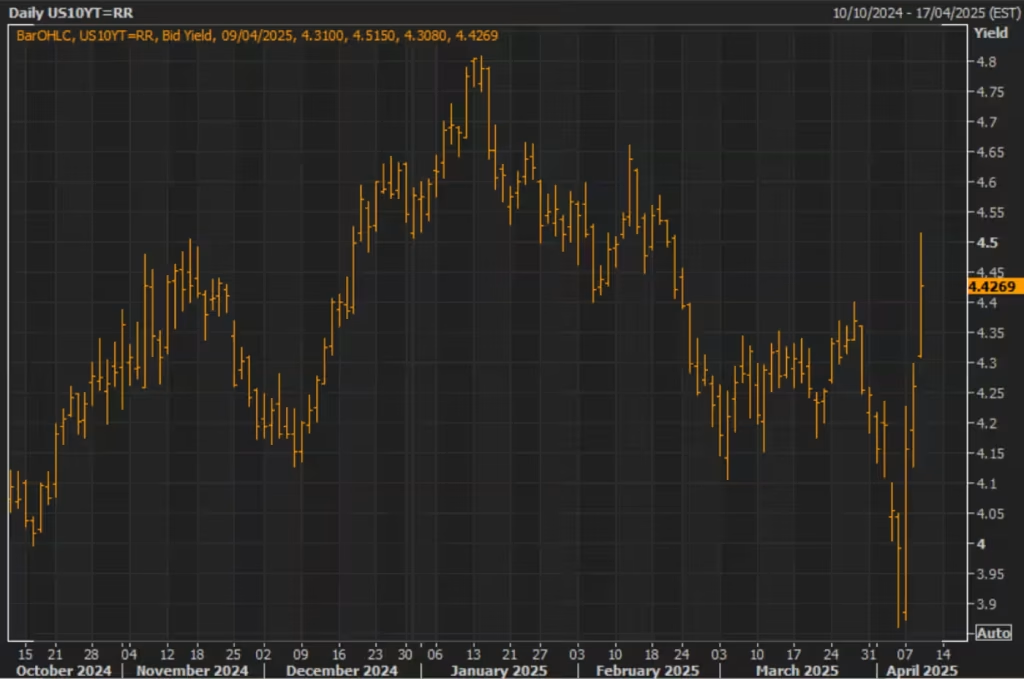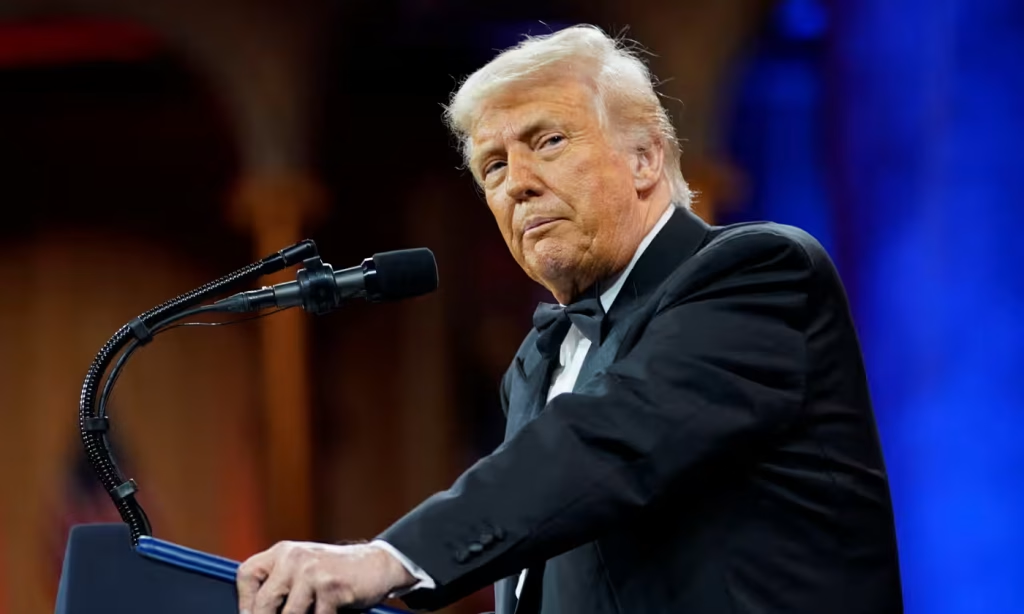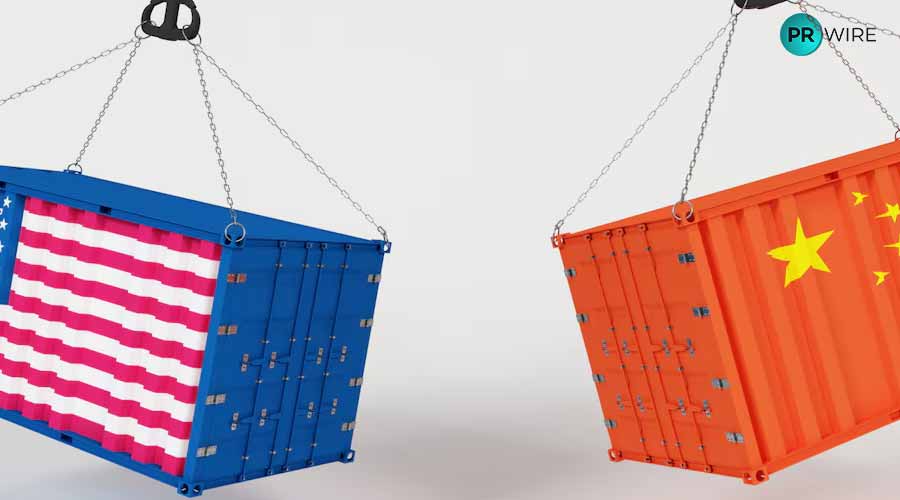Stock markets down from Australia to Japan and Taiwan as Trump presses ahead with plans to hit China with huge retaliatory tariffs
Investors ‘alarmed’ over sell-off in US government bonds
Investors are sounding alarm bells over a steep sell-off in US bonds, traditionally seen as a safe haven for investors around the world, as the reaction to Donald Trump’s tariffs threatened to spread.
The cost of borrowing for the US government has risen sharply this week as investors dumped the bonds usually seen as the safest of assets during market turmoil.
The yield on the benchmark 10-year US Treasury bond rose by 0.16 percentage points on Wednesday to 4.42%, its highest since late February – and this week has seen the three biggest intraday moves since Trump was elected in November. Yields move inversely to prices, so surging yields mean falling prices as demand drops.

The yield on the 10-year US Treasury bond has soared to its highest since February, amid a sell-off in US government debt. Photograph: LSEG
The move in the 30-year bond was more dramatic. The 30-year yield briefly jumped above 5% to its highest since late 2023, according to London Stock Exchange Group data. It was last trading at 4.9157%, or 0.2 percentage points higher than Tuesday.
The US Treasury market is crucial to the functioning of the global financial system, setting the “risk-free” rate against which most other assets are measured. Yet it would be hard to see anything related to Trump’s economic policies as “risk-free” at the moment.
Henry Allen, a strategist at Deutsche Bank, said the sell-off in US government debt was “alarming” in a note to clients this morning.
US Treasury markets are also experiencing an incredibly aggressive selloff as we go to press, adding to the evidence that they’re losing their traditional haven status.
So there’s no sign yet that the market is managing to successfully find a bottom, and it feels like no asset class has been spared as investors continue to price in a growing probability of a US recession.
Some investors have suggested that the higher yields may be caused by investors scrambling to access cash by selling their safe assets. The US Federal Reserve will be watching that dynamic closely, as disordered selling of US government debt would cause turmoil across financial markets.
Jack Chambers, senior rates strategist at ANZ in Sydney, said:
Summary
In case you’re just catching up with the latest upheaval in Donald Trump’s deepening global trade war, here’s a recap of today’s developments. And you can read our latest full report here.
-
Trump’s tariffs on dozens of economies came in force on Wednesday, including 104% levies against Chinese goods, as the US president unleashed a new wave of tariffs against dozens of partners while the US and China were locked in a high stakes game of brinkmanship.
-
Rates on imports to the US from exporters like the European Union or Japan rose further at 12:01am (05:01am BST) Wednesday, after the imposition of sweeping 10% tariffs rocked the global economy since coming into force over the weekend.
-
China has been hardest hit by the tariffs but has shown has shown no signs of backing down, vowing to fight a trade war “to the end” and promising countermeasures to defend its interests. China’s retaliatory tariffs of 34% on US goods are due to enter in force on Thursday.
-
Trump said on Tuesday his government was working on “tailored deals” with trading partners, with the White House saying it would prioritise allies like Japan and South Korea. His top trade official Jamieson Greer also told the Senate that Argentina, Vietnam and Israel were among those who had offered to reduce their tariffs.
-
Trump told a dinner with fellow Republicans on Tuesday night that countries were “dying” to make a deal. “I’m telling you, these countries are calling us up kissing my ass,” he said.

Donald Trump at the National Republican Congressional Committee dinner in Washington DC on Tuesday evening. Photograph: Nathan Howard/Reuters
-
A sell-off across Asian markets resumed on Wednesday, with Japan’s Nikkei down more than 3%, Hong Kong plunging more than 3%, South Korea’s currency hitting a 16-year low and government bonds suffering heavy losses. Australian shares lost billions of dollars of value, while Taiwain stocks fell 5.8% in afternoon trading. Trillions in equity have been wiped off global bourses in the past days.
-
Foreign exchange markets also witnessed ructions, with the South Korean won falling to its lowest level against the dollar since 2009 this week. China’s offshore yuan also fell to an all-time low against the US dollar, as Beijing’s central bank moved to weaken the yuan on Wednesday for what Bloomberg said was the fifth day in a row. Oil prices slumped, with the West Texas Intermediate closing below $60 for the first time since April 2021.
-
India’s central bank cut interest rates, citing “challenging” global conditions.
-
The European Union has sought to cool tensions, with bloc chief Ursula von der Leyen warning against worsening the trade conflict in a call with Chinese premier Li Qiang. She stressed stability for the world’s economy, alongside “the need to avoid further escalation”, an EU readout said.
With news agencies
The article originally appeared on The Guardian




























